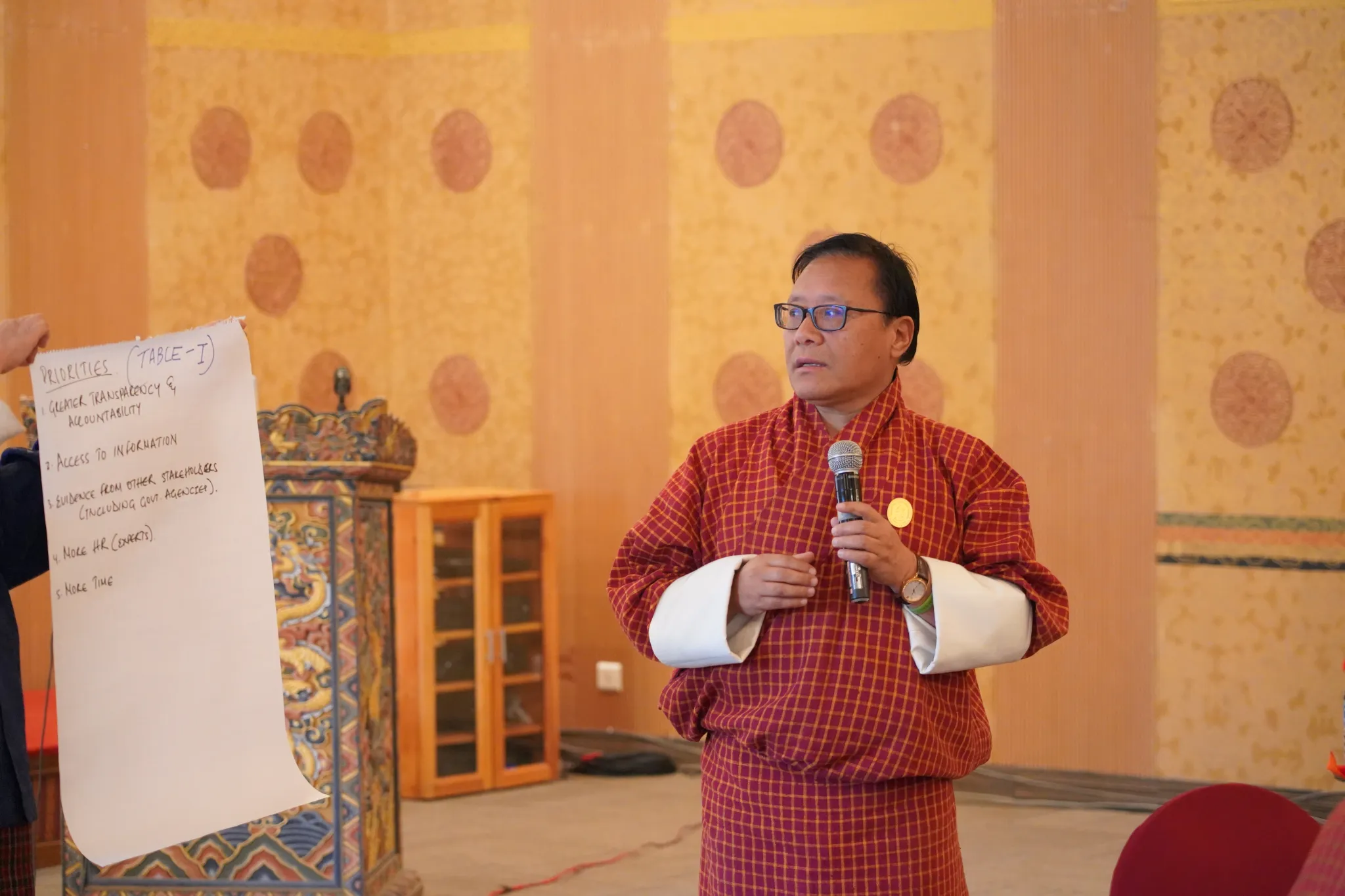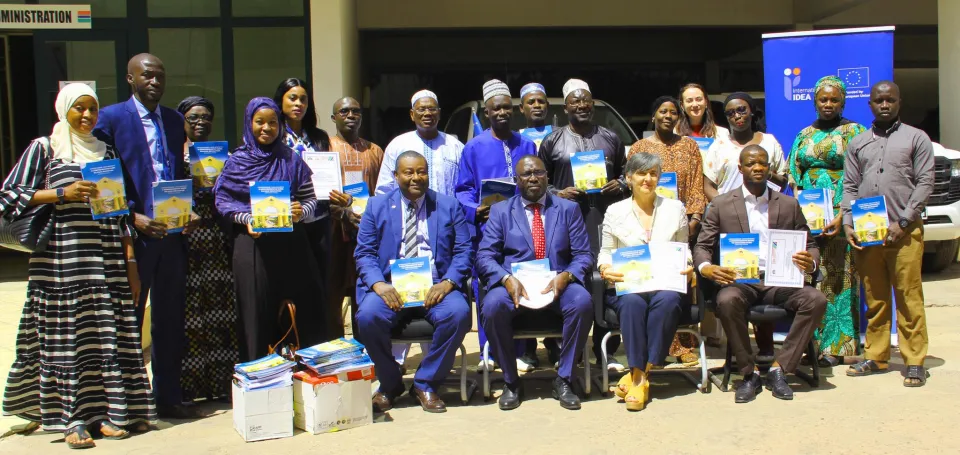Strengthening Bhutan’s parliamentary budget oversight: lessons and reforms

The workshop brought together 14 Members of Parliament and 22 committee secretaries and staff from key oversight committees, including the Public Accounts Committee (PAC) the Economic and Finance Committee of the National Assembly, and the Economic Affairs Committee of the National Council. These parliamentary committees play a central role in reviewing national budget allocations, monitoring public expenditure, evaluating audit findings, and upholding accountability to ensure that public funds are used efficiently to serve Bhutan’s citizens.
Enhancing Oversight Capacity for National Budget Scrutiny
The workshop aimed to enhance the oversight capacity of the Parliament to influence and scrutinize the national budget more effectively. This capacity-building initiative was timed strategically to equip members and staff with knowledge and practical tools in preparation for the upcoming parliamentary session, where the annual national budget will be deliberated. In his keynote address, Honourable Speaker Lungten Dorji emphasized the Parliament’s constitutional duty to ensure the prudent use of public funds, citing Article 14(5) of the Constitution of Bhutan. He said that the “Parliament, as guardian of public funds, has a solemn duty to ensure that national resources are allocated effectively and utilized efficiently”.
Global Perspectives on Financial Scrutiny: Insights from International Experts
Leena Rikkilä Tamang, Director for Asia and the Pacific at International IDEA, also addressed the participants, highlighting that financial scrutiny goes beyond numbers. “It is about ensuring public funds are used equitably and effectively. Around the world, strong parliaments employ robust oversight practices, including public hearings, pre-budget consultations, and independent audits,” Tamang said.
To begin the workshop, The Ministry of Finance led by the Finance Secretary presented an overview of Bhutan’s budget formulation and implementation process. This was followed by interactive sessions on aligning budgetary decisions with national priorities such as economic growth, poverty reduction, and environmental sustainability.
Learning from Australia: A Case Study in Comprehensive Budget Scrutiny
From the second day, the workshop was facilitated by committee experts from the Australian Federal Parliament, Shennia Spillane and Dr Ashley Clements, who provided valuable insights into Australia's comprehensive budget scrutiny mechanisms. Participants explored the structure and workflow of Australia’s parliamentary committees, the process of appropriations, and how the budget moves through both houses of the Parliament. Through the presentation, videos, group exercises, and case studies, the sessions highlighted the importance of committee inquiries, public consultations, and stakeholder submissions. The Australian model’s emphasis on non-partisan committee work, the use of dedicated research offices, and structured public hearings offered valuable lessons that could be adapted to Bhutan’s context.
Promoting Gender-Responsive Budgeting: A Framework for Inclusivity
The final day of the workshop featured a virtual session led by Hannah Johnson, Senior Gender Adviser to the INTERPARES Programme, who introduced gender-responsive budgeting (GRB) as an essential aspect of inclusive fiscal policy. She presented a framework for integrating gender sensitivity throughout the budget cycle. The Chairperson of the National Council, Honourable Sangay Dorji, reinforced this message by stating, “Parliamentarians are well placed to advance gender equality through active engagement in and use of GRB throughout the budget cycle.” Parliamentarians discussed the importance of using disaggregated data and applying an intersectional lens when reviewing policies and fiscal proposals to ensure no group is left behind.
Recommendations for Strengthening Parliamentary Budget Scrutiny
Participants reflected on the need for a more structured and inclusive approach to financial oversight. One of the key recommendations from the workshop was the extension of Bhutan’s parliamentary budget review period. The current three-day timeframe was viewed as inadequate to allow thorough scrutiny. Aligning with good international practices from the OECD and Inter-Parliamentary Union (IPU), participants recommended that the review period be extended to at least two weeks. A longer review would enable deeper engagement by committees and allow for meaningful participation from civil society organizations, media, academia, and the private sector. These public engagements are essential for enhancing transparency, collecting diverse viewpoints, and increasing public trust in the budgeting process.
Strengthening Committee Structures: A Path Towards More Effective Oversight
Participants also explored ways to strengthen committee functions through improved inquiry timelines, more specialized committee structures, and clearer reporting standards. There was strong interest in forming thematic committees focused on areas such as economic policy or infrastructure to provide deeper, non-partisan scrutiny of government spending. Parliamentarians were encouraged to adopt practical tools like post-legislative scrutiny, the use of independent research bodies, and committee reports to enhance the quality of their budget assessments. These mechanisms support the Parliament’s broader mandate to hold the executive accountable and ensure effective public service delivery
Integrating Gender Perspectives into Budgetary Oversight
The importance of integrating gender-responsive budgeting more systematically into parliamentary work was also emphasized. Another consideration would be to appoint MPs with good reputation for championing gender inclusion to maintain momentum and visibility on gender issues within parliamentary proceedings, especially given the low number of women MPs. Incorporating gender considerations into committee planning and questioning would further ensure inclusivity in fiscal policy outcomes.
Toward Strengthening Democratic Governance in Bhutan
Honourable Loday Tseten, Member of the Economic and Finance Committee, summed up the workshops: “As representatives of the people, parliamentarians must play a key role in scrutinizing the budget, as it directly translates into policy decisions. Strengthening our capacity in this area is essential for ensuring sound fiscal policies and actions.”
He also emphasized the importance of structured engagement with civil society, noting the Australian Senate estimates hearings as a model for inclusive, transparent scrutiny processes.
The workshop was organized under the ‘Nyamdrel II: Support to CSOs and Parliament of Bhutan’ project, funded by the European Union and implemented by International IDEA. The discussions and lessons from this workshop are expected to inform and strengthen the parliamentary deliberations in the upcoming budget session and beyond, marking an important step in enhancing Bhutan’s democratic governance.
Key Takeaways and Recommendations
1. Strengthen Budget Scrutiny through Timely and Inclusive Review: Extend Bhutan’s three-day budget review period to at least two weeks to enable thorough examination and encourage stakeholder engagement.
2. Enhance the Role of Committees: Empower committees through stronger inquiry processes, clearer reporting mechanisms, and thematic specialization in areas like economic policy and infrastructure.
3. Institutionalize Public Engagement: Incorporate public hearings and structured stakeholder consultations as a standard part of budget scrutiny, involving CSOs, media, academia, and the private sector.
4. Apply Practical Tools for Oversight: Utilize instruments such as post-legislative scrutiny, independent research bodies, and comprehensive committee reports to support high-quality budget analysis.
5. Advance Gender-Responsive Budgeting: Integrate gender-sensitive scrutiny through committee planning and questioning. Assign a gender champion MP to advocate for inclusive fiscal policy throughout the budget cycle.
6. Contextualize Global Practices for Bhutan: Adapt international best practices to fit Bhutan’s cultural, political, and institutional realities. Bhutan’s strength lies in evolving while remaining rooted in national values.




